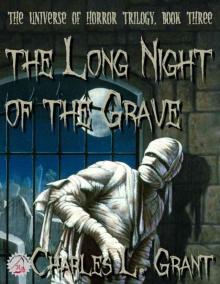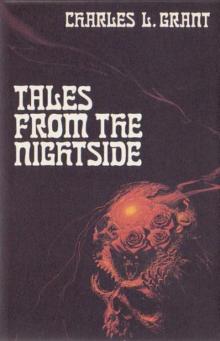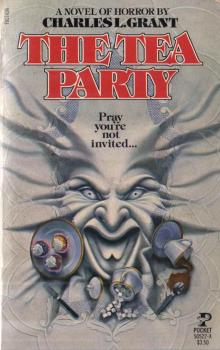- Home
- Charles L. Grant
The Curse Page 2
The Curse Read online
Page 2
"Mrs. Ortiz wouldn't be butting in for milk every damned day."
"She's old, Syd, what do you expect? She can't get out the way she used to."
"We wouldn't have those idiot Carter bastards screaming bloody murder in the middle of the night."
"I think triplets are cute. We should have a few sets some day."
"I could use the front room, the one in the corner, for my layouts, and you could have the middle one for a study. No more drafting boards or easels tripping us in the front room anymore."
"It was kind of cozy. I sort of liked it."
"You're scared, angel."
There was no need for a nod, a theatrical gasp at his apparent ESP, or a quick worried blinking of affirmation. Rent was so easy—one year at a time, and leases painlessly broken when the other tenants became annoyances or the apartment too crowded for their accumulation of memorabilia. A house; and she shivered in spite of the heat, and the lackluster shade. The responsibility, the mortgage, the absolute frightening permanence of everything owning a home implied. After all, she was only twenty-seven—much too young to be rooted like that scarred elm in the back, too full of wings to piece together a permanent nest. It occurred to her as she watched Syd pace off the width of the lawn that he was somehow trying to transform her, mold her Pygmalion-like into a suburban robot that cleaned and dusted and polished and waxed at the mere flick of a marital switch. How could she possibly make progress in her fledgling career and keep a house—so goddamned big, for God's sake from deteriorating into a private, thirty-year indentured slum? It was beyond her, above her, a too powerful giant for her puny female Jack.
When Syd passed her, she reached out and took his arm, stood in front of him, her eyes level with his chin.
She drew a finger through his beard, then scratched her own cheek lightly before biting on an unpainted nail.
"The drive's a little long," he said quietly, "but it would be nice to come home to. To open my own front door without worrying whether or not you left the latch on before you got into the tub. I could mow the lawn on Saturdays like a sane human being. Have a rose garden back there, or over on the side by the empty lot. Put up decorations at Christmas. Stuff like that. You know what I mean?"
She stared at him, trying to reconcile her fears with his dreams, and in his face saw the tension pulling like overloaded gravity at the slightly puffed flesh around his eyes, saw the pleading little boy look fail because of it. There had been something, perhaps the inherent instability, of apartment living that had continuously thwarted his learning to relax completely; and now he had been given the added burden of his job's security. In addition to the gradual decline of the economy as a whole, he was only a minor cog in a minor agency that never saw a month go by without at least one takeover bid from the larger Madison Avenue firms. The worrying tired him; would the new client be pleased with his idea? Were the presentation designs precisely what the campaign demanded? Did President Fellon's unctuous grin mean he'd finally lost his touch, and the client, and the job?
Do yourself a favor, Theresa Ann O'Hare Guiness, and try thinking of your chauvinist partner first for a change.
He watched her, but he didn't push and for that she was glad, a paradox situation since it was the one fault of his she could not abide, his lack of forcefulness. She wandered to the hedge between her—her? God, had she decided already?—her yard and the neighbor to the left. There were no swings or sandboxes or tires hanging from tree limbs. That pleased her; no small children, which was good for late night's work and late morning's sleep. Turning, she saw Syd caressing the gray trunk of one of the quartet of ancient trees that broke up the lawn between house and birch line. Then he looked up and whistled softly to a squirrel twitching its brown-plumed tail. She squinted, and saw him building birdhouses and feeders, laying a patio outside the rec room's sliding glass doors, swearing loudly , while he insisted on constructing his own personal barbecue pit.
Oh, what the hell, she thought. A gesture, then; she reached up and pulled the single black braid of her hair over her shoulder, tugged at it thoughtfully while worrying at the red rubber band at its tip. She shook her head and crossed to the jumble of trees and underbrush that marked the separation of lane and meadow. Again she noticed the slight rise of the untended ground, and a scattering of wildflower and dandelion that poked through the long grass to the top of the rise. Field mice, rabbits, swallows, crows; straight-from-nature models for her illustrations, she thought. A plus if there ever was one. You sure don't find them easily on Third Avenue these days.
Perspiration gathered on her upper lip and she wiped it off, prepared to turn and face Syd's joy when a startlingly sharp glint of metal made her stop and kneel. In a bush covered with small green and dusty leaves was a doll, a rag doll covered with dried mud, its legs and arms stubby and nibbled at. Its head was wooden, the features hastily carved into unusual, disturbing angles, and the eyes were mere gouges. It was jammed into the bush's center close to the roots, but when she reached in to rescue it, thorns dug into her hand.
"What do you got there, angel?"
She yelped and stood quickly, nearly losing her balance as she glared at Syd's apologetic grin. "A toy, a doll," she said, pointing with one hand as she wiped the other against her slacks. "One of those kids at the end of the street must have lost it."
Syd bent over, made interested noises, and started to reach for it. She warned him about the thorns and watched as he debated ignoring her, lost, shrugged and moved her back to the inadequate shade of the largest yard tree.
"Okay, angel my love, what's the verdict before our intrepid guide gets back?"
Don't push, she thought, for God's sake, don't push. And said, "Well, for what we want, I don't see how we could go wrong."
"The agent says it came on the market just this week. We're the first to see it besides him. It'll go fast, he says. Gone like the proverbial wind if we don't act fast."
"There wasn't any furniture left inside," she said, instantly suspicious. "Whoever moved out did it awfully quick, don't you think?"
Syd curved his fingers into claws and passed at her face. "A body in the cellar, an insane old hag secretly the daughter of the mayor locked in the crawlspace that passes for an attic." He dropped his hands and frowned. "Enfallo says it was a quick company transfer. That's what he said. The guy that owned the place had to move out to the West Coast with a week's notice." He shook his head. "Wow, what a hell of a way to make a living."
"Well, maybe, but it's awfully cheap for a place in such good shape. Considering it's what, ten years at the most?"
Syd bit down on his impatience, but Terry didn't look away. "Look, angel," he said, "it's a company sale. They apparently want to get rid of it and write the loss off before they start sinking too much into taxes and things. Or something like that."
Terry hugged herself and looked back at the house. There was pressure, and she didn't like it. Enfallo she could take because pressure, however gentle, was his business weapon, but Syd had a way sometimes of making her feel several notches below absolute idiocy. It wasn't deliberate, and he always denied it when her pride could no longer stand it. But still . . . he had this way about him, and now was exactly the wrong time to bring it out into the open for discussion.
"Well?"
"Come on, Syd, give me a chance to breathe a little."
"Oh, Terry, what more do you want, anyway? It's the right size, neighbors on one side only and I even think the house is deserted, and a whole damned field and woods you can use for the books. What do you want; them to pay us to take it off their corporate hands?"
Enfallo barged through a small gap in the hedge before she could answer, and she winced at the snap of broken branches. "What do you think, eh? What do you think, folks?" He stepped between them and placed heavy damp arms around their shoulders. "Of course, you can always put in central air conditioning if you want—it can handle it, though there's a beautiful breeze that comes in from the field at night. Th
ere's even room for a nursery when you need it. Downstairs, that unfinished place could be a nursery, too, if you didn't want the kid to wake you up at all hours. See what I mean? Perfect. I wouldn't kid you, you know. I want your business again, right? I want you to come to me, Mrs. Guiness, when you're a famous author—children's books, right?—and say, Enfallo, I need to sell this place and get me something a hundred times bigger. So would I lie to you?"
"No," she said, squirming just enough to disengage his arm. "But I don't write, I illustrate."
"What's the difference?" he said, laughing to show he was big enough to admit to a slip in his infallible memory. "You want to come to me again if I do you right, and, of course, I want you to come back. I'm talking to you like you were my own family, Syd and Terry, and I wouldn't kid you at all. Believe me."
"We'll have to think about it," Syd said, and nodded to her. They immediately put the tree between the agent and their conversation.
"I hate him," she said quietly, putting a hand to her face to hide her grin.
"Slimy little bastard, ain’t he? I never trust a man who wears a tie when it's ninety degrees outside, and it's still not midafternoon."
"If he were part of my family, I'd rather be an orphan."
"Maybe we could tell him to buy himself a decent razor with his commission."
They laughed, kissed once, and after a silent staring discussion, rejoined the agent.
"We'll take it," Syd announced, hooking his thumbs into his waistband as though the contracts had already been signed.
"And whatever they're asking," she said, "offer them three thousand less because this yard will need a ton of work, and the paneling downstairs is coming apart at the seams, and that so-called laundry room looks like it could use a good fumigation, about twice a week for the next year. Remember, three thousand less and don't you dare argue with them."
"That's firm."
"No question."
"I'll write you a check for the binder on the way back."
"How soon can you draw up the papers?"
Take that, Terry thought as Enfallo momentarily paled at the rapid instructions. He coughed his anger, straightened his tie, and led them slowly to the front of the house. "Number Three," he said, pointing to the scrollwork over the front door. "It's supposed to be lucky."
"I'm sorry if we came on a little strong," she said, feeling suddenly guilty and knowing Syd would be glaring at her. "We're just a little excited is all. Our first house, if you know what I mean."
"Don't worry about it," Enfallo said, obviously not meaning it, but willing to be considered a game player. "And since you're being so nice to me, Mrs. Guiness, I should probably tell you that this isn't exactly an all-white neighborhood. Not," he said hurriedly when he saw her frown, "that I believe you two to be of the prejudiced nature. You're much too intelligent for that sort of thing. But sometimes, unfortunately, appearances can be deceiving, and it does make a difference to some people about things like that."
"Of course," Syd muttered sourly.
"Blacks do not bother me, Mr. Enfallo," Terry said, as stiffly as she could.
"Blacks?" Enfallo looked around at the nearby houses, then ducked his head as he opened the car door for her. "Blacks? Oh my, not blacks, Mrs. Guiness. Indians."
A sudden squeal of tires cut off her question, and she pressed up against the door as a car backed rapidly out of a driveway opposite the ranch, paused and raced down The Lane. Near the corner, an elderly woman encased in an aluminum walker had reached the center of the street. She looked up at the car, and Terry almost screamed as it swerved toward her, cut away and struck down a dog that had just stepped off the curb.
"He tried to kill her!" Terry said, feeling a surge of bile in her throat. "Syd, did you see that?"
The car had braked in the street, and the driver, ignoring the shouts of the old woman, walked to the corpse of the animal. He looked, down, looked at the woman, then kicked the body into the gutter before returning to his car and driving away.
"Oh, my God, Syd!" She grabbed his arm and hung on tightly. "He tried to kill that woman, then deliberately ran down that poor dog. What kind of a neighborhood is this, anyway?"
Syd pulled her close and turned her away from the scene of the accident. "Take it easy, angel, take it easy. I'm sure it's not what you think." He looked to Enfallo who nodded rapidly. "Come on, angel, get in the car."
"But aren't you going to do something?"
"Do what, love? I don't think it was deliberate, and I doubt Mr. Enfallo does either."
"I'll call the police and report it, Mrs. Guiness," the agent said. "Don't worry."
"That poor old woman," Terry whispered, unable to control her quivering. "I wonder if it was her pet."
"A stray, most likely," Enfallo said. "They're all over nowadays."
"What," Syd said, suddenly changing the subject, "did you mean about there not being blacks but Indians around here? India Indians?"
"No. American Indians. You know, feathers and scalps and all that."
Terry felt herself calming, simultaneously hating herself for the ease with which she hardened herself to the incident. "So what?"
The oversized chest sagged as if the agent had been holding his breath against a reversal of their decision. "Oh, nothing, Mrs. Guiness, but of course I wouldn't feel right if I didn't tell you everything about the neighborhood."
"We're family," she said, sliding into what felt like an oven.
"Absolutely. I just really wouldn't feel right in my heart if I didn't let you in on all the facts concerning your recent move."
"Like wagon trains," she mumbled, then grinned stupidly when he turned around to stare. "I don't think we'll be bothered, and would you mind turning on the air conditioning? It's rather stuffy in here."
Sycophantic to the point of burlesque, the agent switched on the engine and the cooling system, offered them both cigarettes, put the pack hastily away when they refused. He asked about side visors to keep the sun from Syd's face, the correct temperature level for Terry's comfort. Then he headed for Hawthorne Street as though he were in a funeral procession. And fitting, she thought as she stared at the dog's broken body in the gutter; damn, even on a dead end, drivers won't slow down. I'm going to have a word with that man when I find out who he is. The bastard.
Once they were on Hawthorne, however, Terry realized that not all the lots on The Lane had been cleared for housing, and for several hundred yards to either side on the larger road, there were similar untouched parcels of land. In wondering, she tuned out.
Enfallo's prattling about the wisdom of their decision, the dawn of their future now breaking over their bowed and humble heads. "Do they cause any trouble?" she asked suddenly.
"Terry, drop it," Syd muttered, hunching down and away from the cooling unit's blast.
"Those Indians," she persisted. "I want to know if they caused trouble on the block. Parties, drunks, that sort of thing."
"Oh, my, no, Mrs. Guiness. Nothing at all like that."
"Terry, please!"
"It's just that there are those who are somewhat apprehensive, shall we say, about property values and so forth, and they believe—mistakenly, as we both know, Mrs. Guiness—that nonwhites have a depreciatory effect on market prices. In fact, if you want to know the truth, Denver McIntyre is one of the nicest people you'd ever want to meet. The only thing is, he has this . . . what would you call it, an obsession? . . . this thing about the reservation."
"What reservation?" Syd, Terry saw with perverse delight, had finally become interested.
"Why, the one this area used to be, of course. Couple hundred years. Not that long, actually, though to hear Denver talk about it, it was a ghetto even before the whites moved in from the coast. Actually, I think it was back in the 1880s. There are arrowheads all over the place. No totem poles. Just arrowheads."
Terry declined further comment, and in the middle of an explanation to Syd about the building of what the locals called The Lane,
they passed a small, timeworn house with a too bright FOR SALE sign posted in the front yard. A SOLD banner had been affixed across it, and there was a short-haul moving van parked near the front door. A little girl, no more than eight or nine, was standing on the grass watching two men hefting a plastic-covered sofa into the back of the truck. She was crying.
We are going to buy a house, Terry thought as she turned to follow the silent exodus through the rear window. We are really going to buy our very first house. She pinched her wrist, jumped at the pain. Damn! Liberated or not, I think I'm going to cry.
Chapter II
Nine weeks, and through the perversity of her mind's clock they could have been, on alternate days, the same as nine years or nine minutes.
On weekends, armed with bedrolls, scrub brush, pails, and polish, she implanted the first of her housekeeping seeds.
She disposed of the suddenly visible landlord's strenuous objections and none too subtle references to her lease by telling him with acute precision what and where was the best method for storing his security—"Just send us the interest, please, because that's the law. Registered mail, if you don't mind. I wouldn't want you to think we were cheating you."
She despaired at moving all the unattractive, but decidedly their furniture until Syd accompanied a bottle of champagne home with a new account, and flourished a check to dispel her doubts. After a day's searching for sentimental attachments, she called the Salvation Army who promised her a profusion of prayers every day for a year; and she blushed when the young man in the lieutenant's uniform kissed her on the cheek as he carried out a third-hand lamp.
She fought off the superintendent’s whining demands that they paint the apartment before moving: "Look at all them stains, Mrs. Guiness. It'll take me a week and three coats to cover them up right." She folded her arms and glowered: "And while you're at it, Rosen, don't forget to cover up the cracks in the ceiling from Mrs. Ortiz's bathroom that you haven't taken care of since last winter."

![[Oxrun Station] The Orchard Read online](http://i1.bookreadfree.com/i/03/17/oxrun_station_the_orchard_preview.jpg) [Oxrun Station] The Orchard
[Oxrun Station] The Orchard![Riders in the Sky - [Millennium Quartet 04] Read online](http://i1.bookreadfree.com/i/03/20/riders_in_the_sky_-_millennium_quartet_04_preview.jpg) Riders in the Sky - [Millennium Quartet 04]
Riders in the Sky - [Millennium Quartet 04]![Chariot - [Millennium Quartet 03] Read online](http://i1.bookreadfree.com/i/03/19/chariot_-_millennium_quartet_03_preview.jpg) Chariot - [Millennium Quartet 03]
Chariot - [Millennium Quartet 03] The Universe of Horror Volume 1: The Soft Whisper of the Dead (Neccon Classic Horror)
The Universe of Horror Volume 1: The Soft Whisper of the Dead (Neccon Classic Horror)![[Oxrun Station] Dialing The Wind Read online](http://i1.bookreadfree.com/i/03/19/oxrun_station_dialing_the_wind_preview.jpg) [Oxrun Station] Dialing The Wind
[Oxrun Station] Dialing The Wind The Universe of Horror Volume 3: The Long Night of the Grave (Neccon Classic Horror)
The Universe of Horror Volume 3: The Long Night of the Grave (Neccon Classic Horror) The Grave - An Oxrun Station Novel (Oxrun Station Novels)
The Grave - An Oxrun Station Novel (Oxrun Station Novels) The Last Call of Mourning - An Oxrun Station Novel (Oxrun Station Novels)
The Last Call of Mourning - An Oxrun Station Novel (Oxrun Station Novels) The Complete Short Fiction of Charles L. Grant, Volume IV: The Black Carousel
The Complete Short Fiction of Charles L. Grant, Volume IV: The Black Carousel The Bloodwind - An Oxrun Station Novel (Oxrun Station Novels)
The Bloodwind - An Oxrun Station Novel (Oxrun Station Novels) The Curse
The Curse The Complete Short Fiction of Charles L. Grant Volume 1: Nightmare Seasons (Necon Classic Horror)
The Complete Short Fiction of Charles L. Grant Volume 1: Nightmare Seasons (Necon Classic Horror) The Universe of Horror Volume 2: The Dark Cry of the Moon (Neccon Classic Horror)
The Universe of Horror Volume 2: The Dark Cry of the Moon (Neccon Classic Horror) Watcher: Based on the Apocalypse (World of Darkness : Werewolf)
Watcher: Based on the Apocalypse (World of Darkness : Werewolf)![[Oxrun Station] The Bloodwind Read online](http://i1.bookreadfree.com/i/03/25/oxrun_station_the_bloodwind_preview.jpg) [Oxrun Station] The Bloodwind
[Oxrun Station] The Bloodwind The Orchard
The Orchard Night Songs
Night Songs Shadows 3
Shadows 3![Symphony - [Millennium Quartet 01] Read online](http://i1.bookreadfree.com/i1/04/02/symphony_-_millennium_quartet_01_preview.jpg) Symphony - [Millennium Quartet 01]
Symphony - [Millennium Quartet 01] The Hour of the Oxrun Dead (Necon Classic Horror)
The Hour of the Oxrun Dead (Necon Classic Horror)![In the Mood - [Millennium Quartet 02] Read online](http://i1.bookreadfree.com/i1/03/31/in_the_mood_-_millennium_quartet_02_preview.jpg) In the Mood - [Millennium Quartet 02]
In the Mood - [Millennium Quartet 02] The Complete Short Fiction of Charles L. Grant Volume 3: Dialing the Wind (Neccon Classic Horror)
The Complete Short Fiction of Charles L. Grant Volume 3: Dialing the Wind (Neccon Classic Horror)![[Oxrun Station] The Last Call of Mourning Read online](http://i1.bookreadfree.com/i2/04/05/oxrun_station_the_last_call_of_mourning_preview.jpg) [Oxrun Station] The Last Call of Mourning
[Oxrun Station] The Last Call of Mourning The Pet
The Pet Tales from the Nightside
Tales from the Nightside The Tea Party - A Novel of Horror
The Tea Party - A Novel of Horror The Complete Short Fiction of Charles L. Grant Volume 2: The Orchard (Necon Classic Horror)
The Complete Short Fiction of Charles L. Grant Volume 2: The Orchard (Necon Classic Horror) Whirlwind
Whirlwind Jackals
Jackals The Sound of Midnight - An Oxrun Station Novel
The Sound of Midnight - An Oxrun Station Novel